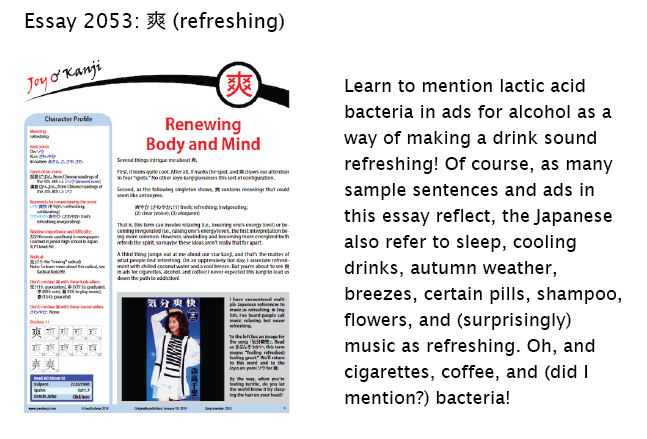What I Learned from "Seinfeld" and the 爽 Essay
There are many ways to refresh the mind and body. My favorites include going for a walk, heading to the woods or beach, disappearing into the world of a movie, or traveling. Sleeping is also a pretty good path to a fresh start! Whatever the method, one is likely to see life in a slightly new way afterward.
Coincidentally, working on essay 2053 about 爽 (refreshing) gave me that kind of fresh outlook. That is, I came to look at extremely familar words in new ways because they kept turning up in unexpected contexts, bearing meanings I didn't know existed.
Here's a rundown of what I learned from the new essay 2053, little of which has to do with 爽 itself!
Words Starting with Kana
I am always thrown off when a word contains kanji but starts with kana. Just as it feels right to put a capital letter at the beginning of "Elizabeth," rather than writing "eliZabeth," instinct tells me that a Japanese word should start with a kanji.
But as I learned from Seinfeld (starting at 2:14), "If every instinct you have is wrong, then the opposite would have to be right." Many of my instincts with Japanese are dead wrong. So it is with this phrase, which features 爽快感 (そうかいかん: refreshed feeling):
キレの良い爽快感
I figured 良い had to be "good." Did that mean キレ was an abbreviation of きれい (beautiful)? That sort of fit. But no. Here is the first half of the phrase:
キレの良い (切れのよい: lit. “crispness is good,” meaning “having a crisp taste”)
The katakana stands for 切れ! From a certain point of view, that makes sense; 切 has to do with "cutting," 切れ can mean "sharpness," and "crispness" isn't far off.
Here, then, is the translation of the phrase:
キレの良い爽快感
tastes crisp and refreshing
There's more refreshment to be had in the following sentence, which showcases 気分爽快 (きぶんそうかい: feeling refreshed):
私はプールでひと泳ぎしたので、気分爽快だった。
I swam in the pool, so I felt refreshed.
私 (わたし: I)
The translation is correct, and I've defined the kanji on either end, but what's going on in the middle? I "saw" only 泳ぎ. Nope, this is the word to perceive:
ひと泳ぎ (ひとおよぎ: a swim)
Is it ひと like 人 (person)? Nope again. The hiragana corresponds to 一, so you could rewrite the compound as 一泳ぎ, literally "one swim." Oh! So why didn't they present it that way?!
Let's try a different sentence and see if that goes any better! Surely, 思う (おもう: to think) ought to be a slam-dunk. Foiled again! This sentence, which features 爽やか (さわやか: refreshing), really threw me:
晴れた、爽やかな天気がくずれたと思うと、土砂降りになることがよくある。
As soon as the weather becomes clear and refreshing, it often deteriorates and turns into heavy rain.
晴れた (はれた: clear (weather)); 天気 (てんき: weather); くずれる (崩れる: to turn bad); 土砂降り (どしゃぶり: downpour)
In this case 思う is part of the following syntax:
Aと思うとB (AとおもうとB: lit. “as soon as one thinks that A has happened, B happens,” which is to say “B happens right after A happens”)
As long as we're doing the ABCs, or at least AB, here's another AB puzzler, one that involves 爽快 (そうかい: refreshing) and appears on a can of Sapporo beer, of all places:
風味爽快にして
風味 (ふうみ: taste)
We know we have a refreshing taste at hand. The hiragana is the sticking point here.
People usually use the syntax AにしてB, so the absence of a “B” makes this phrase sound unfinished; 風味爽快にして means “tastes refreshing, and ..."
Counterintuitive Katakana
I often find kana harder than kanji! Here are more katakana items to add fuel to that fire:
• コップ means "glass (e.g., of beer)," not "cup." Ugh. Will that ever feel natural to me? Dictionaries say that コップ comes from the Dutch word kop, not the English “cup.” Meanwhile, カップ does mean “cup." And then グラス means “glass,” as with ワイングラス (wineglass). But glass for a window (窓, まど) is 窓ガラス, not 窓グラス! The ガラス again comes from Dutch, from the word glas.
• レギュラーコーヒー means "regular coffee," which is quite logical. But as opposed to what? Some Starbucks concoction that turns the coffee into a liquid candy bar? No, nothing like that. It's regular coffee as opposed to instant coffee!
Weird Hybrids of Kanji and Kana
These hard-to-fathom examples also come from essay 2053:
口あたり (くちあたり)
効あり (こうあり)
The kanji precedes the kana, so at least the words have their heads screwed on right, so to speak. But what could these terms mean? I'll block the answers with a preview of essay 2053:
Okay, here we go:
口あたり (くちあたり: taste; the feeling in the mouth)
効あり (こうあり: having an effect)
In 口のあたり, the last part corresponds to 当たり (hit, success), so something "hits the mouth," resulting in a certain taste or texture. Simplification has left us with 口あたり.
Meanwhile, the archaic 効あり correlates with the contemporary 効がある or 効果がある (こうかがある), both meaning "to have an effect."
A Medicinal Riddle
Here's a riddle for you:
薬用 (やくよう) medicine + use
This has to mean "medicinal use," right? Of course it should. So of course it doesn't!
Rather, it means “good for your health but not a medicine.” If the product were actually medicinal, the 薬用 part would have been 医薬品 (いやくひん: medical goods).
Go with the Seinfeld approach!
Different Definitions
Here are two words that I've seen again and again, always with the definitions I've supplied:
丁寧 (ていねい: polite)
贅沢 (ぜいたく: luxury), in which 贅 is non-Joyo
I love the second word. I wrote about it in essay 1552 on 沢 (marsh; plentiful), and ever since then I've known it without fail. This time ... fail!
Here's the ad phrase from essay 2053 that includes 丁寧:
エルダーフラワーをじっくり丁寧に蒸留し
thoroughly and carefully distilling elderflowers
じっくり (thoroughly; without rushing);
丁寧 (ていねい: careful); 蒸留 (じょうりゅう: distillation)
The blue word means "careful" in this case! Well, elderflowers don't go in much for politeness, so I guess that's for the best.
Here's the other phrase, coincidentally from the same ad:
淡〜くほのかな香りが贅沢すぎる
a light, faint scent that is just too beautiful
淡わい (あわい: light); ほのか (faint);
香り (かおり: scent); 贅沢 (ぜいたく: extravagant)
Now 贅沢 means "extravagant," which isn't far from "luxury," but it becomes "beautiful" in the phrase translation!
Note the term ほのか (faint). That strikes me as another tricky instance of hiragana, particularly because one needs to pick it out from the string くほのかな.
Adverbs That Are Impossible to Remember
The elderflower phrase started with this adverb:
じっくり (thoroughly; without rushing)
Is there anything there to make that word stick in the brain? No, not in mine!
And how about these three terms, all from the essay, all odd-looking hybrids of katakana and hiragana, and all nearly homophonous:
スカッと (onomatopoeia used to describe that wonderful feeling of accomplishment after overcoming a difficult task or finding the solution to a difficult problem)
スキッと (feeling refreshed)
スパッと (completely)
The Monkey Who Doesn't Want to See
How refreshed are you feeling at this point?! Perhaps you can see with new eyes, or perhaps you're more in this mode:

Catch you back here next time!
❖❖❖
Did you like this post? Express your love by supporting Joy o' Kanji on Patreon:



Comments